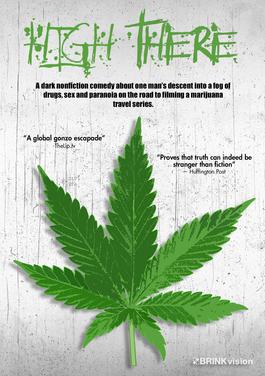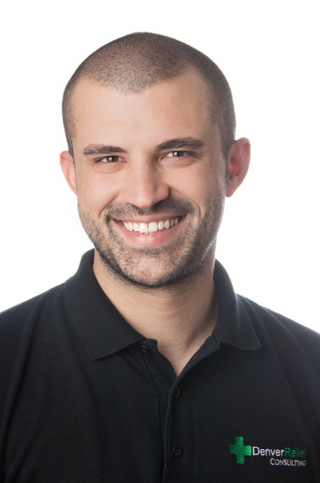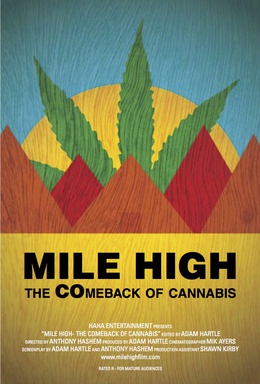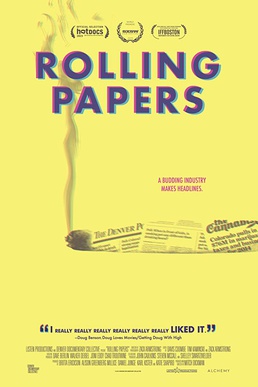Related Research Articles

420, 4:20 or 4/20 is cannabis culture slang for marijuana and hashish consumption, especially smoking around the time 4:20 p.m. (16:20). It also refers to cannabis-oriented celebrations that take place annually on April 20.

In the United States, the removal of cannabis from Schedule I of the Controlled Substances Act, the category reserved for drugs that have "no currently accepted medical use", is a proposed legal and administrative change in cannabis-related law at the federal level. After being proposed repeatedly since 1972, the U.S. Department of Justice initiated 2024 rulemaking to reschedule cannabis to Schedule III of the Controlled Substances Act. The majority of 2024 public comments supported descheduling, decriminalizing, or legalizing marijuana at the federal level.
Super High Me is a 2007 documentary film about the effects of smoking cannabis for 30 days. Directed by Michael Blieden, the documentary stars comedian Doug Benson. The documentary's name and its poster are plays on the 2004 documentary Super Size Me.

In Colorado, cannabis has been legal for medical use since 2000 and for recreational use since late 2012. On November 7, 2000, 54% of Colorado voters approved Amendment 20, which amended the State Constitution to allow the use of marijuana in the state for approved patients with written medical consent. Under this law, patients may possess up to 2 ounces (57 g) of medical marijuana and may cultivate no more than six marijuana plants. Patients who were caught with more than this in their possession could argue "affirmative defense of medical necessity" but were not protected under state law with the rights of those who stayed within the guidelines set forth by the state. The Colorado Amendment 64, which was passed by voters on November 6, 2012, led to recreational legalization in December 2012 and state-licensed retail sales in January 2014. The policy has led to cannabis tourism. There are two sets of policies in Colorado relating to cannabis use: those for medicinal cannabis and for recreational drug use along with a third set of rules governing hemp.

In the United States, cannabis is legal in 38 of 50 states for medical use and 24 states for recreational use. At the federal level, cannabis is classified as a Schedule I drug under the Controlled Substances Act, determined to have a high potential for abuse and no accepted medical use, prohibiting its use for any purpose. Despite this prohibition, federal law is generally not enforced against the possession, cultivation, or intrastate distribution of cannabis in states where such activity has been legalized. Beginning in 2024, the Drug Enforcement Administration has initiated a review to potentially move cannabis to the less-restrictive Schedule III.

Charlotte's Web is a brand of high-cannabidiol (CBD), low-tetrahydrocannabinol (THC) products derived from industrial hemp and marketed as dietary supplements and cosmetics under federal law of the United States. It is produced by Charlotte's Web, Inc. in Colorado. Hemp-derived products do not induce the psychoactive "high" typically associated with recreational marijuana strains that are high in THC. Charlotte's Web hemp-derived products contain less than 0.3% THC.
Andy Juett is an American actor, stand-up comedian, writer, producer, host, and comedy event director in Denver, Colorado. He is a partner in Sexpot Comedy and was one of the co-founders of High Plains Comedy Festival.

High There is a 2014 dark, nonfiction comedy film about a real-life, legendary but down-and-out tabloid television journalist who heads to Hawaii to film a marijuana travel series, only to become lost in a fog of drugs, sex and paranoia as he uncovers a secret government war to control the marijuana trade. The film touches on the controversial federal prosecution of marijuana advocate Roger Christie and his THC Ministry.

Kayvan Khalatbari is an Iranian-American entrepreneur; he was a mayoral candidate in Denver, Colorado, in 2019.

The "Burnside Burn" was an event held on the Burnside Bridge in Portland, Oregon, starting at midnight on July 1, 2015, the day recreational marijuana became legal in the U.S. state of Oregon. It was organized by Portland NORML, the local chapter of the National Organization for the Reform of Marijuana Laws, having originated from its executive director, who wanted to photograph himself in front of the White Stag sign in the moments after Oregon Ballot Measure 91 took effect. The crowd, larger than anticipated, numbered in the thousands and at times blocked traffic lanes on the bridge. Some attendees wanted to commemorate the moment, while others were motivated by announcements of free marijuana and seeds. No fines were issued for consumption in public. The event was covered by cannabis publications, local and national news outlets, and the HBO television series Vice.

Adam Hartle was an American stand up comedian.
Morgan Spurlock Inside Man is an American documentary series which aired on CNN. Episodes featured Morgan Spurlock investigating a range of topics from an insider's perspective.

The Florida Medical Marijuana Legalization Initiative, also known as Amendment 2, was approved by voters in the Tuesday, November 8, 2016, general election in the State of Florida. The bill required a super-majority vote to pass, with at least 60% of voters voting for support of a state constitutional amendment. Florida already had a medical marijuana law in place, but only for those who are terminally ill and with less than a year left to live. The goal of Amendment 2 is to alleviate those suffering from these medical conditions: cancer, epilepsy, glaucoma, positive status for human immunodeficiency virus (HIV), acquired immune deficiency syndrome (AIDS), post-traumatic stress disorder (PTSD), amyotrophic lateral sclerosis (ALS), Crohn's disease, Parkinson's disease, multiple sclerosis, chronic nonmalignant pain caused by a qualifying medical condition or that originates from a qualified medical condition or other debilitating medical conditions comparable to those listed. Under Amendment 2, the medical marijuana will be given to the patient if the physician believes that the medical use of marijuana would likely outweigh the potential health risks for a patient. Smoking the medication was not allowed under a statute passed by the Florida State Legislature, however this ban was struck down by Leon County Circuit Court Judge Karen Gievers on May 25, 2018.

Ricardo Baca is an American journalist best known for being the first full-time marijuana rights editor for a major American newspaper. He was an editor at The Denver Post, producing The Cannabist for over three years until December, 2016. He is the "central character" of the 2015 documentary film Rolling Papers. He also shares his name with the first person to be convicted for the possession of marijuana after the Marijuana Tax Act of 1937 was put into action.
High Profits is an eight-part CNN documentary television series about Breckenridge Cannabis Club and the U.S. state of Colorado's legal cannabis industry. The series began airing on April 19, 2015.

Mile High: The Comeback of Cannabis is a 2014 documentary film directed by Anthony Hashem and featuring comedian activist Adam Hartle.

Rolling Papers is a 2015 documentary film directed by Mitch Dickman and featuring Ricardo Baca. The "deceptively rote title" is said to be a winking reference to Baca's work as a newspaper writer.
Steve Ryan Berke is a co-founder of the International Church of Cannabis, two-time candidate for mayor of Miami Beach, cannabis activist, rapper, YouTuber, entrepreneur, and former All-American tennis player.

The COVID-19 pandemic had a significant impact on the cannabis industry. Investor's Business Daily said the industry was affected as "customers stock up on prescriptions and recreational customers load up on something to make the lockdown a little more mellow or a little less boring".
References
- ↑ "Tom Tancredo Catches 'Contact Buzz' As Filmmaker Smokes Legal Weed". The Huffington Post. 2014-07-03. Retrieved 2017-01-25.
- ↑ "Mile High ... Jacksonville's Own take on Denver - Void Magazine | Jacksonville Florida | North Florida Culture". Voidlive.com. Retrieved 2017-01-25.
- ↑ "Filmmakers offer free pot to see Mile High: The Comeback of Cannabis". Deadline Hollywood . 2014-07-07. Retrieved 2017-01-25.
- ↑ Ben Beaumont-Thomas. "Film-makers give away free marijuana to promote documentary | Film". The Guardian . Retrieved 2017-01-25.
- ↑ "Former Congressman Scores Free, Legal Marijuana At Film Premiere". The Huffington Post . Retrieved 2017-01-25.